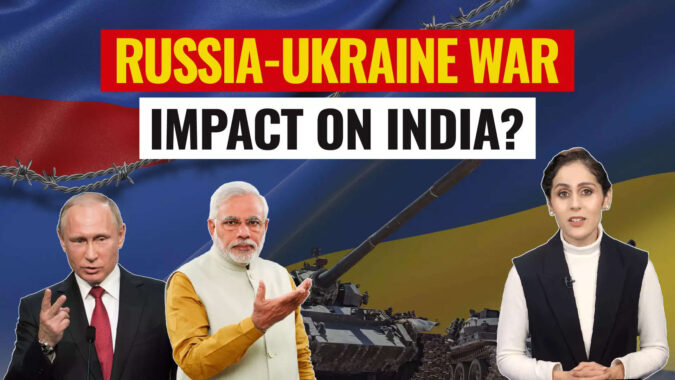But what exactly are these tensions between Russia and Ukraine, and how do they affect the rest of the world?
What’s the conflict about?
There is no one cause or explanation for the complicated conflict involving Russia and Ukraine. As soon as Russia acquired Crimea, which had previously been a part of Ukraine, hostility and tensions erupted.
In response to the international community’s widespread condemnation of the annexation, the US and EU imposed economic penalties on Russia.
While some experts contend that the conflict has deeper roots and is a component of a larger geopolitical conflict between Russia and the West, other elements that may have contributed to the current unrest include Ukraine’s economic and political instability as well as the nation’s protracted linguistic and cultural divisions.
How does the Russia-Ukraine war impact India? #russiaukrainewar #indianeconomy
What is the impact of the conflict?
The crisis has witnessed a rise in tensions between Russia and the West in addition to the recent violence in Ukraine. In April 2021, America charged Russia of amassing soldiers close to the Ukrainian border, raising unsettling worries about the possibility of a world war.
Thankfully, the situation has now de-escalated, but the protracted war has raised tensions between Russia and the West.
For Ukraine, the conflict has had negative political and economic effects. The World Bank reports that Ukraine’s GDP growth rate dropped from (+)2.3% in 2013 to (-)9.8% in 2015, and that the value of the hryvnia, the country’s currency, fell by more than 50% versus the US dollar in only one year, from 2014 to 2015.
According to the International Monetary Fund, the conflict led to a significant decline in foreign direct investment in Ukraine, which went from $7.8 billion in 2013 to barely $2.6 billion in 2015.
Energy industry takes a hit
The violence has also had an impact on the energy sector globally. Violence on the ground has halted the supply of gas through Ukraine, a crucial transit nation for natural gas travelling from Russia to Europe.
As a result, there is a shortage of supply, prices have increased, and there is a growing forced reliance on alternative energy sources. 81 billion cubic metres of natural gas was imported from Russia via Ukraine in 2015; down significantly from 162 billion cubic metres in 2008.
Disruptions in trade and investment
Additionally, the violence has hampered regional investment and trade. The Indian Embassy in Ukraine reports that the conflict led the bilateral trade between the two nations to practically halve, from $2.2 billion in 2013 to $1.6 billion in just two years, by 2015.
Despite having historically good connections with both Russia and Ukraine, India finds it very challenging to remain neutral in this situation. India has up till now maintained its neutrality, but it has had to delicately balance its relations with both Putin and Zelenskyy.
Due to this struggle, India’s foreign policy has also gotten more complicated. India has generally adhered to a non-alignment policy, but the Ukrainian situation makes it challenging for India to take an impartial position.
The Ukraine crisis has soured relations between Russia and the West on a geopolitical level, with each side accusing the other of meddling in the conflict.
Economic sanctions and other punitive measures have been imposed as a result, which has heightened tensions between Russia and the West.
How is India dealing with global impacts?
While the conflict’s effects will continue to be felt by the world for some time to come, the good news is that so far, the India-first stand maintained by the Indian government has helped to prevent further escalation of the conflict. India has expressed its concerns over the ongoing conflict, emphasizing the importance of finding a peaceful and diplomatic solution.
India’s External Affairs Minister Dr. S. Jaishankar, has said that India has a “stake in peace and stability” in the region, and has emphasized the need for all parties to resolve their differences through dialogue.
India has also maintained bilateral relations with both Russia and Ukraine. In separate meetings with his Russian and Ukrainian counterparts in 2020, Indian Foreign Minister S. Jaishankar expressed India’s support for a peaceful end to the conflict. India has also been stepping up its economic ties with Ukraine by inking trade, agricultural, and energy deals.
The Ukrainian crisis affects the entire world, especially in terms of power dynamics and global security. It has emphasised the value of international organisations like the UN and the necessity of cooperation between nations in resolving disputes and preserving peace. Given the disruption in gas supply brought on by the conflict, it has also highlighted the significance of energy security and diversification.
It is critical that all parties attempt to find a peaceful and diplomatic settlement even though the situation is still tight.
India’s neutral position and interaction with both Russia and Ukraine have helped to stop the crisis from escalating further and may be helpful in reaching a resolution.
